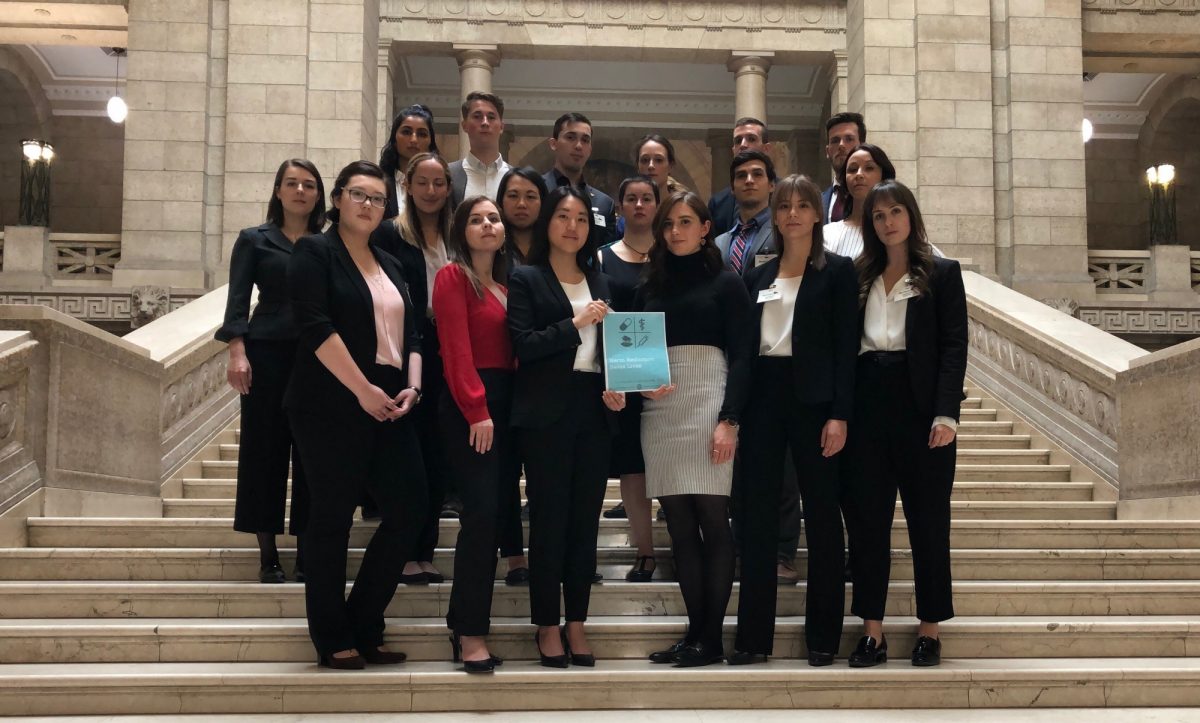
The Manitoba Medical Students’ Association’s (MMSA) Student Advocacy Committee lobbied the government at the Manitoba Legislative Building on April 19. From left to right; back row: Fatemeh Bakhtiari, Lourens Jacobs, Chris Moskal, Dara Hallock, Luke Brueton-Campbell, Alexander Sharp; middle row: Steffany King, Rheann Brownstone, Sara Wang, Emilie Carey, Nick Czehryn, Diana Craig; front row: Meredith Chiu, Rudney Jay, Julie Jung Min Hong, Amanda Mathwig, Rebecca van Ginkel, Katie Takatch.
Medical students lobby province for harm reduction strategies
A group of Max Rady College of Medicine students wants Manitoba politicians to implement harm reduction strategies to address substance use and addictions.
The 14 students belong to the Manitoba Medical Students’ Association’s (MMSA) Student Advocacy Committee, which researches issues affecting communities in the province and advocates for change.
Each year, the committee chooses a health-related issue that is of concern to Manitobans. The group spends about eight months researching and writing a report, along with developing recommendations, which they present to politicians at the Manitoba Legislative Building.

Fatemeh Bakhtiari is a second-year medical student and co-lead of the Student Advocacy Committee.
Fatemeh Bakhtiari, a second-year medical student and co-lead of the committee, said the group wanted to make sure the message they sent this year was strong and backed by plenty of research because they knew that lobbying for harm reduction strategies would be an uphill battle.
“We wanted to make sure the province understood that this is really important to medical students and Manitobans,” she said.
Provincial Lobby Day – the day the committee meets with politicians – was held on April 19. The committee’s four recommendations for the government are: to develop a centralized harm reduction supply network, to create a de-stigmatization campaign, to develop a harm reduction strategy, and to conduct a feasibility study to assess the need for supervised drug consumption sites in Manitoba.
Bakhtiari said the committee developed recommendations that are feasible to implement.
“I think they will require funding initially, but in the long term there will be quite a bit of savings within our health-care system,” she said. “More importantly, many Manitobans’ lives will be saved.”

Alexander Sharp is a second-year medical student, president of the MMSA’s Addictions Education Group and the lead researcher on the Lobby Day project.
Alexander Sharp, a second-year medical student, president of the MMSA’s Addictions Education Group and the lead researcher on the project, said the group’s initial idea was to lobby for supervised consumption spaces. However, after consulting with community organizations, the committee saw that there were issues that needed to be addressed first.
“The big one is a harm reduction supply distribution network,” Sharp said, explaining that such a network provides needles and other safe injection supplies, like sterile water, alcohol wipes and tourniquets. It also supplies safe smoking supplies and naloxone kits, which can save the life of someone who has an opioid overdose.
“Manitoba is one of the few provinces that doesn’t have this kind of supply network,” Sharp said. “We have a more reactionary approach to our harm reduction services instead of proactive, which is not effective for the clients who need it.”
A de-stigmatization campaign should be created for the general public, Sharp said. “A lot of people misunderstand that people who use drugs experience a lot of personal stigma, where they don’t want to ask for help because they don’t feel like they deserve it,” he said. “They feel like they are not good members of society.”
A public campaign that humanizes and shows compassion for people who use drugs can reduce shame and make it more likely that they will seek help, Sharp said.

From left to right: Alex Sharp, Nick Czehryn, Health Minister Cameron Friesen, Fatemeh Bakhtiari, and Joe Asaminew.
The students met with Health Minister Cameron Friesen, and also had meetings with members of the Progressive Conservatives, Manitoba Liberals and NDP.
Bakhtiari said the meeting with the health minister was very positive.
“He was there to listen,” she said. “The general sense was that he was on board with these ideas, but there was no sense of urgency. So my hope is that we can have another meeting with the minister of health to show that we are very serious about wanting these recommendations implemented, and that there is a need and an urgency.”
The committee now plans to host community events to share its research and discuss addiction services and issues surrounding substance use in Manitoba. The students also have plans to create a letter-writing campaign to continue to lobby for change.
Read the committee’s full report here.






